2015 Mini Cooper S Engine
When the revamped MINI was launched in 2001 only one bodystyle was available on the market - the MINI Hatch. Nearly 20 years later, the range has grown significantly with seven individual body types now on offer to meet the needs of just about every type of driver. In addition, each body shape has a range of engines that you can choose from, from the economical models that are perfect for day to day use, to the sportier models that provide more power - perfect for track days and performance tuning. While to some the Hatch is still the original and best MINI available, more family friendly options like the Countryman and Paceman along with the much sportier Coupe and Roadster means that the MINI's popularity continues to grow. With so many options out there it can be confusing to know which MINI is which, not just to know which MINI is the best fit for you but to make sure that you get the correct parts. To help you out, here's Lohen's run down of MINI Cooper models.
Types of MINI Body Styles
There are 7 main styles of MINI Cooper, whilst all boast the tell tale signs of the quintessentially British MINI shape and personality, all have been designed to completely suit its user. Whilst most models tend to have a lifespan of around seven years, usually after three to four years they receive a facelift in what BMW refers to as an LCI, or life cycle impulse.
MINI Generations Explained
MINI models are often grouped by 'Generation', each defined by a range of years of production. It's important to know which Generation your MINI is in order to find the correct parts for your vehicle, as parts vary between the models. Gen 1 MINI: 2002-2008 Gen 2 MINI: 2007-2016 Gen 3 MINI: 2014+ MINI Cooper models, just like their parent company BMW, uses letter codes "R" and "F", followed with 2 digits to categorise and refer to the vehicle's chassis code. R-type MINI Coopers are Gen 1 and Gen 2, whilst F-type MINI Coopers are Gen 3 only.
Generation 1
The 'R50' MINI hatchback was the first model launched under the new MINI marque, after the original Mini was discontinued earlier that same year. R50 Hatch (2000-2006) Variants: One, Cooper, One D R52 Convertible (2002-2007) Variants: One, Cooper, Cooper S, JCW R53 Hatch (2002-2006) Variants: Cooper S, JCW, GP
Shop MINI Generation 1 parts
R50 - MINI Hatch
The MINI Cooper Hatch is renowned for its low-centre-of-gravity and exhilarating go-kart feel, giving users complete control when navigating through cities. Their front-wheel drive and great cornering ability means the Hatch can make ideal track cars, particularly when modded with performance upgrades and best of all R53 models support the same chassis and suspension upgrades as the R50. 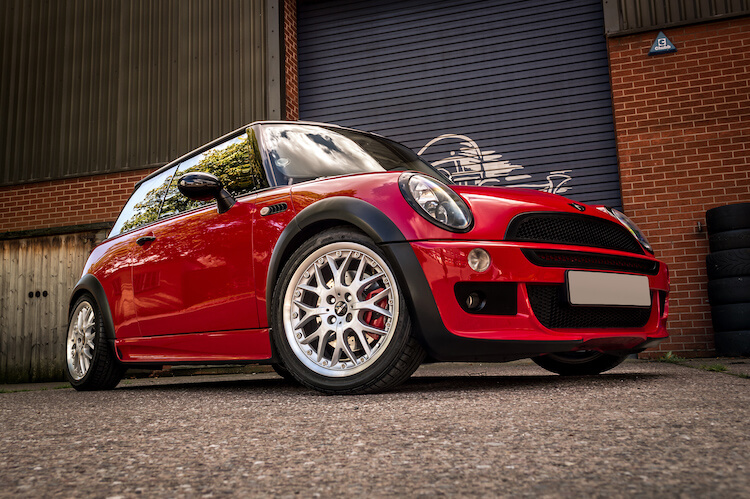 Unfortunately, this model due to its age tends to suffer from oil leaks and rust, and as the factory stock brakes are very small, we'd recommend upgrading the brakes to a more substantial option. The R50 had 3 main engine types: One - W10 engine featuring a de-tuned version of the Cooper engine, but can be remapped to produce the same power. One D - the first diesel MINI engine Cooper - can be tuned up to around 140 bhp, but needs to be revved above 4000 RPM to get the most power from the engine. Benefits most from a performance exhaust manifold and performance camshaft.
Unfortunately, this model due to its age tends to suffer from oil leaks and rust, and as the factory stock brakes are very small, we'd recommend upgrading the brakes to a more substantial option. The R50 had 3 main engine types: One - W10 engine featuring a de-tuned version of the Cooper engine, but can be remapped to produce the same power. One D - the first diesel MINI engine Cooper - can be tuned up to around 140 bhp, but needs to be revved above 4000 RPM to get the most power from the engine. Benefits most from a performance exhaust manifold and performance camshaft.
R52 - MINI Convertible
The MINI Convertible, on the other hand, is suited for those who enjoy a slower life driving with the top down, exploring towns, cities and more rural settings with friends. When the roof is closed, the multiple layers in the soft-top provide a high level of sound insulation. The first convertible option available on the market was made until 2007 and all engine options were available from One to the supercharged Cooper S. The main drawback with this model was that it suffers from extra body roll and chassis flex when cornering compared with the hatch.
R53 - MINI Hatch
The supercharged version of the R50, the R53 has really found a home on the track, thanks to its popular supercharger and ease of upgrading. For a modest budget of around £1,500 you can easily expect an output of 220 bhp and with further modifications from Lohen you can reach up to 270 bhp, giving you an affordable and fast track car. If going down the track route, a W11 engine is recommended as a more robust and reliable option than the stock N14 engine, and it's a good idea to add strut tower defenders to stop deformation or mushrooming. 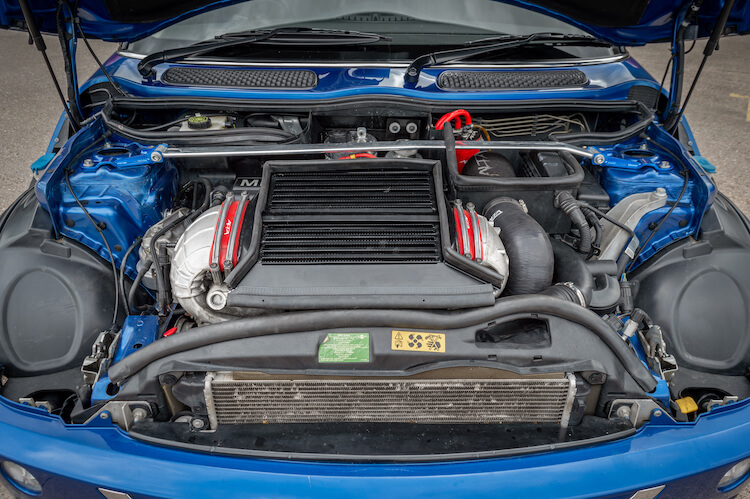 There were 3 main models released for the R53, each with its own slight adjustments to the W11 engine providing more power than the R50 W10 engines: Cooper S - First model from MINI with a supercharger and supports the same chassis, suspension and brake upgrades as the R50. JCW - Produces more power than the Cooper S due to a higher flowing head, manifold, higher capacity 380cc injectors and an 11% reduced supercharger pulley. GP - The fastest R53 model producing 215 bhp and built for the track with a high-performance intercooler, rear strut brace and no rear seats. It's 10mm lower than the standard Cooper S, has stiffer more aggressive suspension and comes with a GP spoiler and custom Recaro GP seats. The GP is also one of the rarest models out there, with only 2,000 units produced in its limited run.
There were 3 main models released for the R53, each with its own slight adjustments to the W11 engine providing more power than the R50 W10 engines: Cooper S - First model from MINI with a supercharger and supports the same chassis, suspension and brake upgrades as the R50. JCW - Produces more power than the Cooper S due to a higher flowing head, manifold, higher capacity 380cc injectors and an 11% reduced supercharger pulley. GP - The fastest R53 model producing 215 bhp and built for the track with a high-performance intercooler, rear strut brace and no rear seats. It's 10mm lower than the standard Cooper S, has stiffer more aggressive suspension and comes with a GP spoiler and custom Recaro GP seats. The GP is also one of the rarest models out there, with only 2,000 units produced in its limited run.
Generation 2
While it may not look much different, the R56 MINI Hatch featured a 'new and improved' look, a re-engineered platform and numerous design updates. The easiest way to tell between an R53 (Gen 1) and R56 (Gen 2) is the R53 headlights are stored within the bonnet. Gen 2 also welcomed the Clubman, Coupe, Roadster, Paceman and Countryman to its family to cater to a wider variety of drivers. R55 Clubman (2006-2013) Variants: One, Cooper, Cooper S, JCW, One D, Cooper D, Cooper SD R56 Hatch (2006-2013) Variants: One, Cooper, Cooper S, JCW, GP2, One D, Cooper D, Cooper SD R57 Convertible (2007-2015) Variants: One, Cooper, Cooper S, JCW, One D, Cooper D, Cooper SD R58 Coupe (2010-2015) Variants: Cooper, Cooper S, Cooper SD, JCW R59 Roadster (2010-2015) Variants: Cooper, Cooper S, Cooper SD, JCW R60 Countryman (2010 > ) Variants: One, Cooper, Cooper ALL, Cooper D, Cooper D ALL4, Cooper S, Cooper S ALL4, Cooper SD, Cooper SD ALL4, JCW R61 Paceman (2010 > ) Variants: Cooper, Cooper ALL, Cooper D, Cooper D ALL4, Cooper S, Cooper S ALL4, Cooper SD, Cooper SD ALL4, JCW
Shop MINI Generation 2 parts
R55 - MINI Clubman
The MINI Clubman knows the value of first impressions – it's stylish and superbly crafted for the city life. This MINI boasts 5 doors – including split rear doors – and seating for five - making it the perfect drive for both long and short trips with a family. 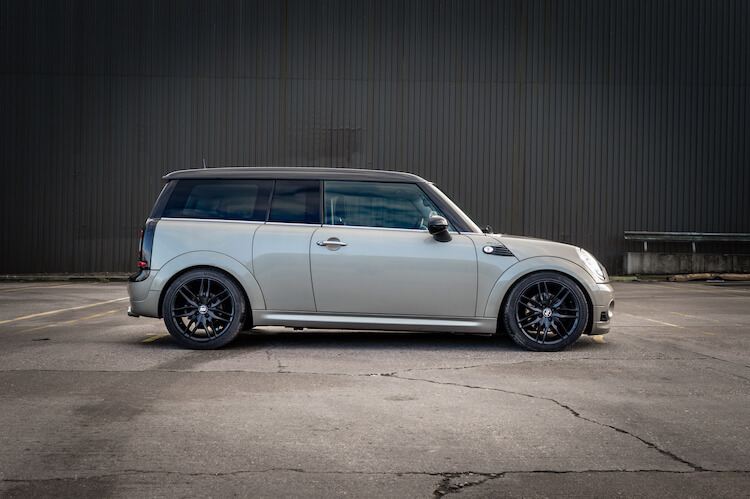 Despite the addition of a cargo area at the rear of the car, which provided far more luggage space than the MINI Hatch, critics of the Clubman noted that this created a lot of road noise, particularly at high speeds and the overall size was still not big enough when compared to similar models on the market from competitors. The R55 is a slightly larger MINI but still retains the same go-kart handling that makes the car so appealing. For modding, the R55 can have the same engine upgrades as the R56.
Despite the addition of a cargo area at the rear of the car, which provided far more luggage space than the MINI Hatch, critics of the Clubman noted that this created a lot of road noise, particularly at high speeds and the overall size was still not big enough when compared to similar models on the market from competitors. The R55 is a slightly larger MINI but still retains the same go-kart handling that makes the car so appealing. For modding, the R55 can have the same engine upgrades as the R56.
R56 - MINI Hatch
First available in 2006, the R56 marked an all new, re-engineered version of the R50 / R53, based around the Prince engine, a more cost-effective and fuel-efficient model from PSA Peugeot Citroen. As with most MINI variants, some tweaks from the stock fitments can improve overall usability and performance. Removing the standard run-flat tyres can provide a much more comfortable ride, and as the front-rear wishbone bushes are a common failure point, we'd recommend upgraded Powerflex bushes to help improve handling. The chassis takes a similar design from the R53, but is more refined with fewer rattles and reduced road noise. The R56 provides are huge canvas of opportunities for modifications and improving performance, dependent on the engine models available: Cooper S & JCW - These turbocharged models are capable of an extra 40 bhp from a modest budget of only £600, whilst with more investment you can expect output of up to 400 bhp. If you're after more turbo noise, we'd recommend fitting a blow-off valve or induction kit and, if the engine is being tracked frequently, we'd highly recommend forging the engine. There are, however, well documented issues with the N14 engines, including oil starvation, so regular oil checks are recommended to reduce the risk of further damage.
READ MORE: How do the N14 & N18 MINI engines compare?
JCW - With a slightly sportier body kit and providing a larger turbo than the Cooper S, the JCW provides more power out of the factory too with 210 bhp. The JCW also comes with a higher flow manifold, and lower compression pistons than the Cooper S but still gives you plenty of options for upgrades and modifications. GP2 - As with the GP that came before it, the GP2 is predominantly a track-based car with no rear seats, a rear strut brace and custom Bilstein suspension which provides a lower ride height than the JCW and Cooper S models. The limited edition GP2 Recaro seats, GP2 spoiler as well as front and rear diffusers add to the sporty feel of the car. Another highly sought-after model, production was limited to only 2,000 units in a limited run.
R57 - MINI Convertible
Replacing the ever popular R52, the R57 came with improved styling and engineering that was intended to be closer to the Hatch. Although not as adept for the track as the Hatch, partly in thanks due to the weight of the retractable roof and a less rigid chassis, the R57 can have the same engine modifications as the R56.
R58 - MINI Coupe
With a unique roof, lower stance on the road and flat rear deck, the MINI Coupe stands out from the rest of the MINI line-up. With a lower centre of gravity than the hatch and a slight shift of weight distribution towards the front axle, the Coupé takes the MINI's dynamic ability a step further. Whilst not conventionally beautiful, the coupe has seating for 2 people, which adds space for a larger boot, making it the perfect urban car for couples living in the city.
R59 - MINI Roadster
The Roadster was another step into the sportscar world for MINI. A sister of the Coupe, the Roadster is fit for 2 people with a low centre of gravity to navigate through both narrow city roads with the convertible top down or challenge long stretches of motorway at pace. 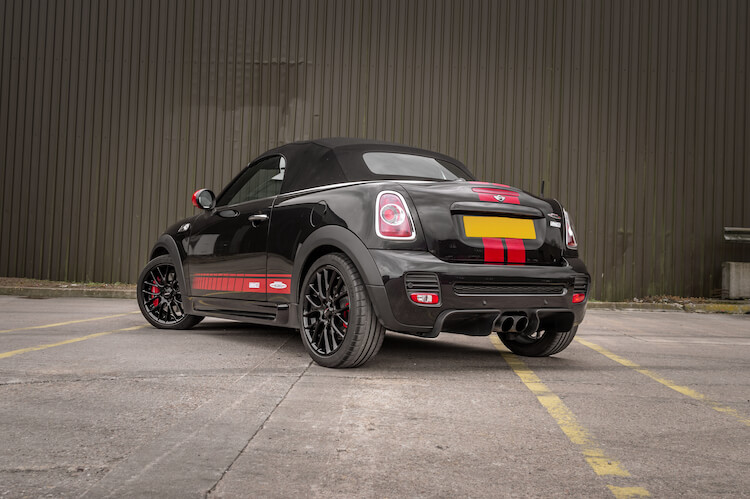 Often confused with the R57, the Roadster has the same wheelbase as the Hatch and Convertible so whilst you can get a similar drive out of it, it's not the best suited for track days and performance handling. If you did want to mod your Roadster, it can benefit from the same engine tuning modification options as the R56.
Often confused with the R57, the Roadster has the same wheelbase as the Hatch and Convertible so whilst you can get a similar drive out of it, it's not the best suited for track days and performance handling. If you did want to mod your Roadster, it can benefit from the same engine tuning modification options as the R56.
R60 - MINI Countryman
The MINI Countryman is an adventurer – a versatile car with off-road capabilities, ideal for longer journeys. At just under 4.1 metres long, it is a versatile Sport Activity Vehicle, which is also optionally available with ALL4 all-wheel-drive for more challenging terrain. For an 'SUV', although admittedly much smaller in stature to a traditional SUV, the Countryman handles exceptionally well, providing the fun of a MINI with the comfort of a larger vehicle. 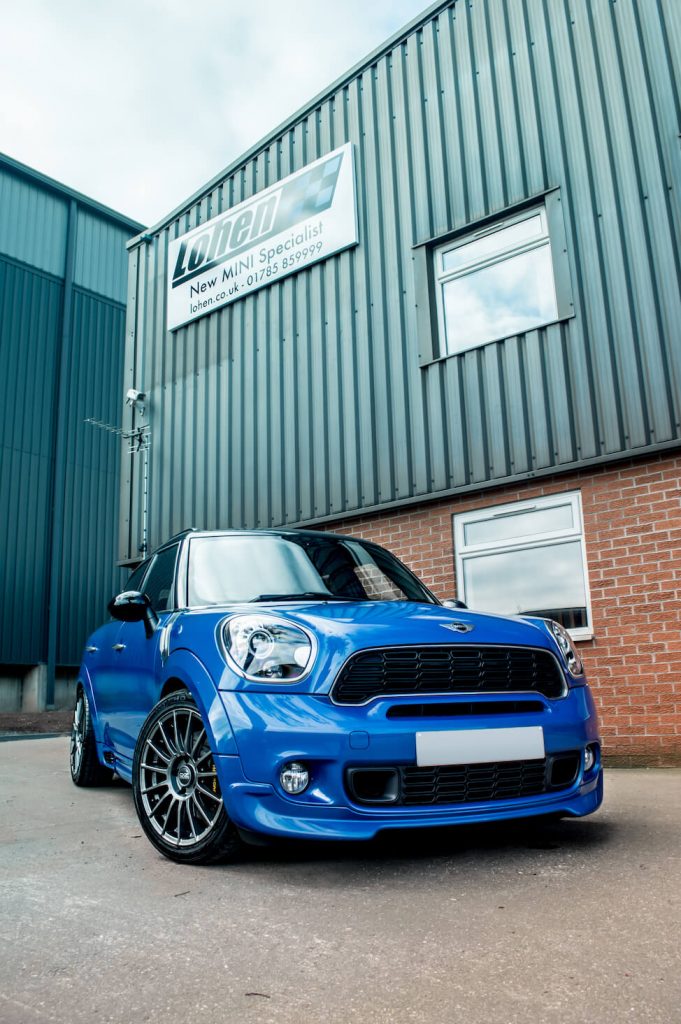 For those looking to upgrade, there's a plethora of upgrades and mods available for engine, chassis, suspension and brakes to make a Countryman your own. For those who like their cars to be unique, the JCW R60 version is much rarer than the GP2.
For those looking to upgrade, there's a plethora of upgrades and mods available for engine, chassis, suspension and brakes to make a Countryman your own. For those who like their cars to be unique, the JCW R60 version is much rarer than the GP2.
R61 - MINI Paceman
The concept of a three-door version of the Countryman seems to contradict the big MINI's practical traits of extra space and family friendly versatility. However, following in the footsteps of the Range Rover Evoque, this 3 door SUV styles a sloping roofline and broad rear haunches to give the car an aggressive stance that MINI's Countryman lacks. 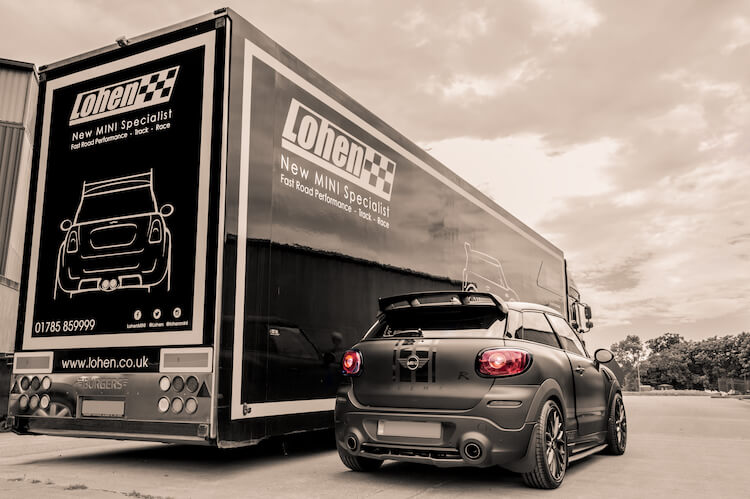 The Paceman is essentially just a Coupe version of the R60, so most modifications compatible with the R60 will also fit the R61, but if you're unsure please contact our team for further advice.
The Paceman is essentially just a Coupe version of the R60, so most modifications compatible with the R60 will also fit the R61, but if you're unsure please contact our team for further advice.
Generation 3
Gen 3 dropped the Coupe and Roadster in order to fine tune and create several body variants for the MINI Hatch, Convertible, Clubman and Countryman. The new generation also featured greater safety measures, including forward collision warning and a rear view camera in order to keep competitive in an ever-growing safety-conscious market. F54 Clubman (2014 > ) Variants: One, Cooper, Cooper ALL4, Cooper S, Cooper S ALL4, JCW ALL4, One D, Cooper D, Cooper D ALL4, Cooper SD, Cooper SD ALL4 F55 Hatch (5 door) (2013 > ) Variants: One, Cooper, Cooper S, One D, Cooper D, Cooper SD F56 Hatch (3 door) (2013 >) Variants: One, Cooper, Cooper S, Challenge 210, JCW, One D, Cooper D, Cooper SD F57 Convertible (2015 > ) Variants: One, Cooper, Cooper S, JCW, Cooper D, Cooper SD F60 Countryman (2017 > ) Variants: Cooper, Cooper D, Cooper S, JCW Countryman, Cooper SD, Cooper S E
Shop MINI Generation 3 parts
F54 - MINI Clubman
Although a direct replacement for the R55 model, the F54 has been almost completely redesigned. With a lower road height when compared with the Countryman and larger interior space provides a much more comfortable drive for both the driver and passengers. The JCW models from 2019 onwards feature the most powerful MINI engine yet with an output of 302 bhp - equivalent to the GP3 - and also featured an 8 speed transmission with manual shift. Engine upgrades are available for Pre-LCI models whilst suspension, chassis and brake upgrades are available for all F54 models.
F55 - MINI Hatch (5 Door)
Whilst it might not be at the top of die-hard MINI fans wish list, the F55 saw a huge leap for MINI as it looks to cater for the modern market by offering 2 rear doors, providing more passenger comfort in a larger car whilst still retaining the MINI aesthetic. Although essentially a 5 door version of the F56, the F55 is much less supported when it comes to chassis, brake and suspension modifications. However, the majority of the engine modifications from the F56 should be compatible with the F55.
F56 - MINI Hatch
The F56 represents the first MINI to be built from the ground up by BMW with a new chassis and engine. As well as all the additional features that modern drivers expect from their cars such as integrated SatNavs, media players and visually appealing dashboards the F56 is generally considered to be the most reliable model yet. From 2018, the LCI variants of the F56 featured the Union Jack rear lights - which can be retrofitted by Lohen for those pre-LCI F56 models. 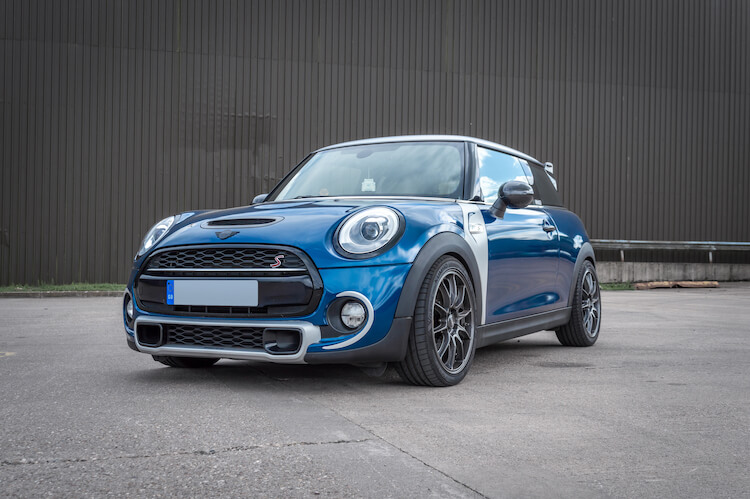 There's also a much more comfortable driving experience from the F56 thanks to improvements made in sound isolation, seating and a much better automatic gearbox than previous models - 6 speed for Cooper S and 8 Speed for JCW. Cooper - fun, tunable and with good fuel economy, this engine represents the first 3 cylinder engine in a MINI and is the first model to have far more tuning options than Cooper models that came before it. With modifications from Lohen, you can expect to get up 200 bhp from the 1.5l engine. Cooper S & JCW - at 2.0l, the B48 4 Cylinder Twin Scroll Turbo is the largest engine featured on a MINI to date, with better fuel economy than previous generations. With modifications from Lohen, the Cooper S is capable of up to 300 bhp, whilst the JCW can be modded up to 320 bhp.
There's also a much more comfortable driving experience from the F56 thanks to improvements made in sound isolation, seating and a much better automatic gearbox than previous models - 6 speed for Cooper S and 8 Speed for JCW. Cooper - fun, tunable and with good fuel economy, this engine represents the first 3 cylinder engine in a MINI and is the first model to have far more tuning options than Cooper models that came before it. With modifications from Lohen, you can expect to get up 200 bhp from the 1.5l engine. Cooper S & JCW - at 2.0l, the B48 4 Cylinder Twin Scroll Turbo is the largest engine featured on a MINI to date, with better fuel economy than previous generations. With modifications from Lohen, the Cooper S is capable of up to 300 bhp, whilst the JCW can be modded up to 320 bhp.
F57 - MINI Convertible
Again building on the success of the R52 and R57 models, the two-door convertible, first produced in 2015 can benefit from the same engine modifications as the F56. The JCW F57 has a Cooper S intercooler due to extra chassis reinforcements at the front.
F60 - MINI Countryman
The second generation of Countryman was first made available in 2017 and, as with the R60, the F60 model is available in front-wheel or a much improved four-wheel drive variant. From 2019 onwards, the JCW models featured the most powerful MINI engines yet, racking up to 302bhp, the same output as the GP3 engine. The JCW model also features an impressive 8 speed automatic transmission with Normal, Sport and Eco modes available. Given that this is one of the most recent additions, tuning options are limited for the F60 model and in addition, a facelift is expected to be released later in 2020. 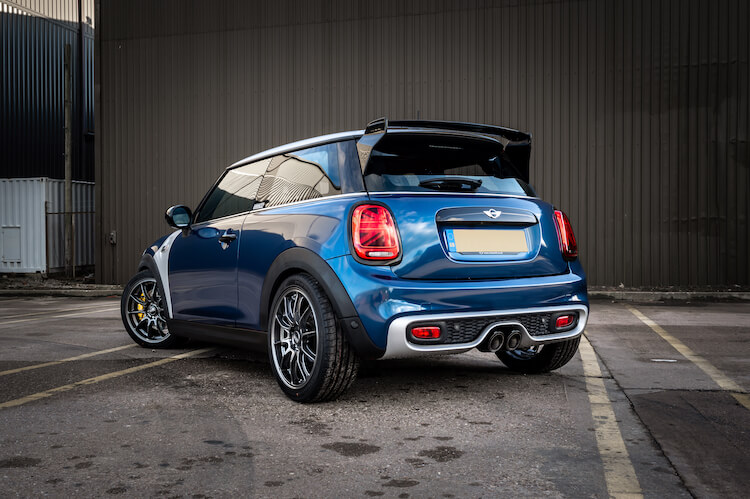 We hope that we took the guesswork out of knowing which MINI Cooper model you own throughout the course of this article. If not, our expert team is at hand to help - feel free to contact us on 01785 859999 by email on [email protected] or Facebook or Instagram.
We hope that we took the guesswork out of knowing which MINI Cooper model you own throughout the course of this article. If not, our expert team is at hand to help - feel free to contact us on 01785 859999 by email on [email protected] or Facebook or Instagram.
Source: https://www.lohen.co.uk/blog/know-your-car-mini-cooper-models-explained.html
